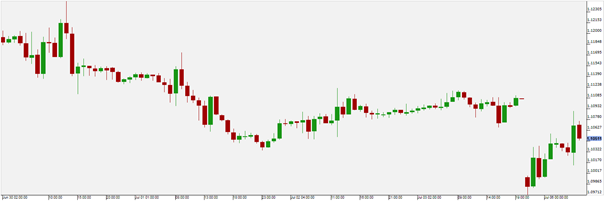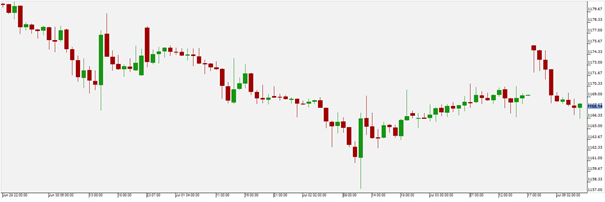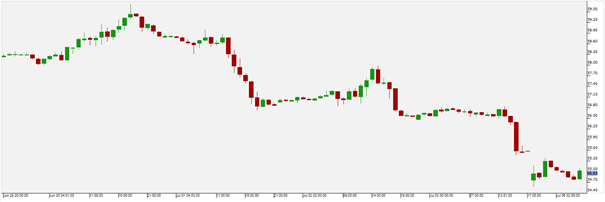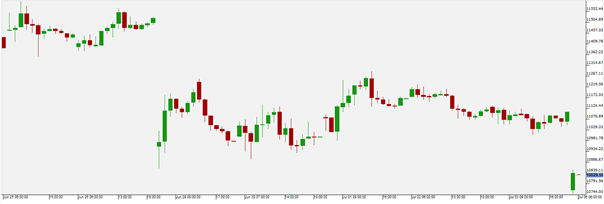Greek voters said "no" on Sunday, declining further austerity measures and leaving European leaders to decide on whether the country will remain in the euro or not. Sixty-one percent of voters backed Prime Minister Alexis Tsipras's rejection of further spending cuts and tax increases in a referendum that's also taken the country to the brink of financial collapse. Tsipras described the result as a "great victory", and said Athens would return to the negotiating table on Monday with a strengthened hand. The result send the first shock waves to the markets with a drop in the euro to a four-week low against the dollar, while DAX futures opened with a huge gap of more than 350 points to the downside. Asian stocks hit a six-month low with Japan's Nikkei falling by 2.4 percent, while U.S. equity futures dropped 1.3 percent. German Chancellor Angela Merkel and French President Francois Hollande called for an emergency leaders' summit on Tuesday. The two leaders will first meet Monday in Paris to discuss Europe's next move. The result turns the tables on Merkel and Greece's other creditors, who must now decide if a financial rescue of the region's most-indebted country is still possible. Elsewhere, in China, over the weekend it was reported that the country is establishing a market-stabilization fund aimed at fighting off the recent stock selloff. For Monday, Germany is to release data on factory orders, while in the U.S., the Institute of Supply Management is to release data on service sector activity.
The euro posted a sharp drop on Monday after the Greek referendum resulted in a rejection of the proposed bailout terms from international creditors, raising concerns regarding the country's financial system, its future in the euro zone and the reactions from other indebted members of the bloc. Reports suggested that as many as 60% of voters rejected the terms with Greek Prime Minister Alexis Tsipras saying that the "no" vote has provided the country a stronger hand to continue negotiating with creditors. German Chancellor Angela Merkel and French President Francois Hollande called for an emergency leaders' summit on Tuesday. The two leaders will first meet Monday in Paris at 6:30 p.m. to discuss Europe's next move. For Monday, Germany is to release data on factory orders, while in the U.S., the Institute of Supply Management is to release data on service sector activity.

Pivot: 1.1085
Support: 1.098; 1.095; 1.09
Resistance: 1.1085; 1.112; 1.1155
Scenario 1: Short positions below 1.1085 with targets @ 1.098 & 1.095 in extension.
Scenario 2: Above 1.1085 look for further upside with 1.112 & 1.1155 as targets.
Comment: As long as 1.1085 is resistance, look for further downside.
GOLD
Gold prices rose slightly in Asia on Monday after Greek voters rejected the bailout terms from international creditors and as the European leaders are preparing to tackle any upcoming market turbulence, extreme reactions and contagion effects. Asian policymakers in China and Japan are also preparing for any fallout from the Greek 'No' vote at the weekend as Greece's Prime Minister, Alexis Tsipras said Sunday he wanted a quick deal with its creditors and to restore banking sector operations to avert a humanitarian crisis. For today, a meeting between German Chancellor Angela Merkel and French President Francois Hollande will be in focus as they meet Monday in Paris to discuss Europe's next move. Elsewhere, the Institute of Supply Management in the U.S. is to release data on service sector activity.

Pivot: 1163
Support: 1163; 1156.3; 1153
Resistance: 1175; 1180.5; 1185
Scenario 1: Long positions above 1163 with targets @ 1175 & 1180.5 in extension.
Scenario 2: Below 1163 look for further downside with 1156.3 & 1153 as targets.
Comment: The RSI lacks downward momentum.
OIL
Oil prices fell sharply on Monday after Greek voters rejected the bailout terms proposed by creditors while China took emergency measures to prevent a stock market crash, raising concerns about poor demand for the fuel. The result of the Greek referendum added strong pressures on the euro against the dollar on Monday affecting oil demand as the fuel will be more expensive for holders of other currencies. In China, brokerages and fund managers agreed to buy massive amounts of stocks to support markets. This turmoil in Chinese financial markets combined with the recent rise in U.S. drilling rigs, and a potential increase in Iranian oil supply continue to pressure the markets as investors attention is shifted towards an emergency leaders' summit on Tuesday.

Pivot: 56.8
Support: 54.4; 53.7; 52.6
Resistance: 56.8; 57.95; 58.4
Scenario 1: Short positions below 56.8 with targets @ 54.4 & 53.7 in extension.
Scenario 2: Above 56.8 look for further upside with 57.95 & 58.4 as targets.
Comment: As long as 56.8 is resistance, likely decline to 54.4.
DAX
DAX futures took a big hit after Greece voted 'No' to harsh bailout conditions, posting a drop of more than 350 points. Markets are now waiting for the response of the European Central Bank's and are on watch for any signs of contagion. Economists at U.S. banking giant JPMorgan (NYSE:JPM) stated that "Although the situation is fluid, at this point Greek exit from the euro appears more likely than not,". Many banks said the central bank may also have to issue a statement on anti-contagion measures - perhaps holding out the possibility of expanding its quantitative easing program in order to calm wider markets. Deutsche Bank (XETRA:DBKGn) said it was prepared for any market volatility. Investors' attention is shifted towards a meeting between Hollande and Merkel on Monday, and on an 'emergency leaders' summit on Tuesday.

Pivot: 10800
Support: 10800; 10370; 10000
Resistance: 11600; 11900; 12390
Scenario 1: Long positions above 10800 with targets @ 11600 & 11900 in extension.
Scenario 2: Below 10800 look for further downside with 10370 & 10000 as targets.
Comment: The RSI is mixed.
Which stock should you buy in your very next trade?
AI computing powers are changing the stock market. Investing.com's ProPicks AI includes 6 winning stock portfolios chosen by our advanced AI. In 2024 alone, ProPicks AI identified 2 stocks that surged over 150%, 4 additional stocks that leaped over 30%, and 3 more that climbed over 25%. Which stock will be the next to soar?
Unlock ProPicks AI